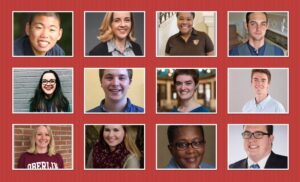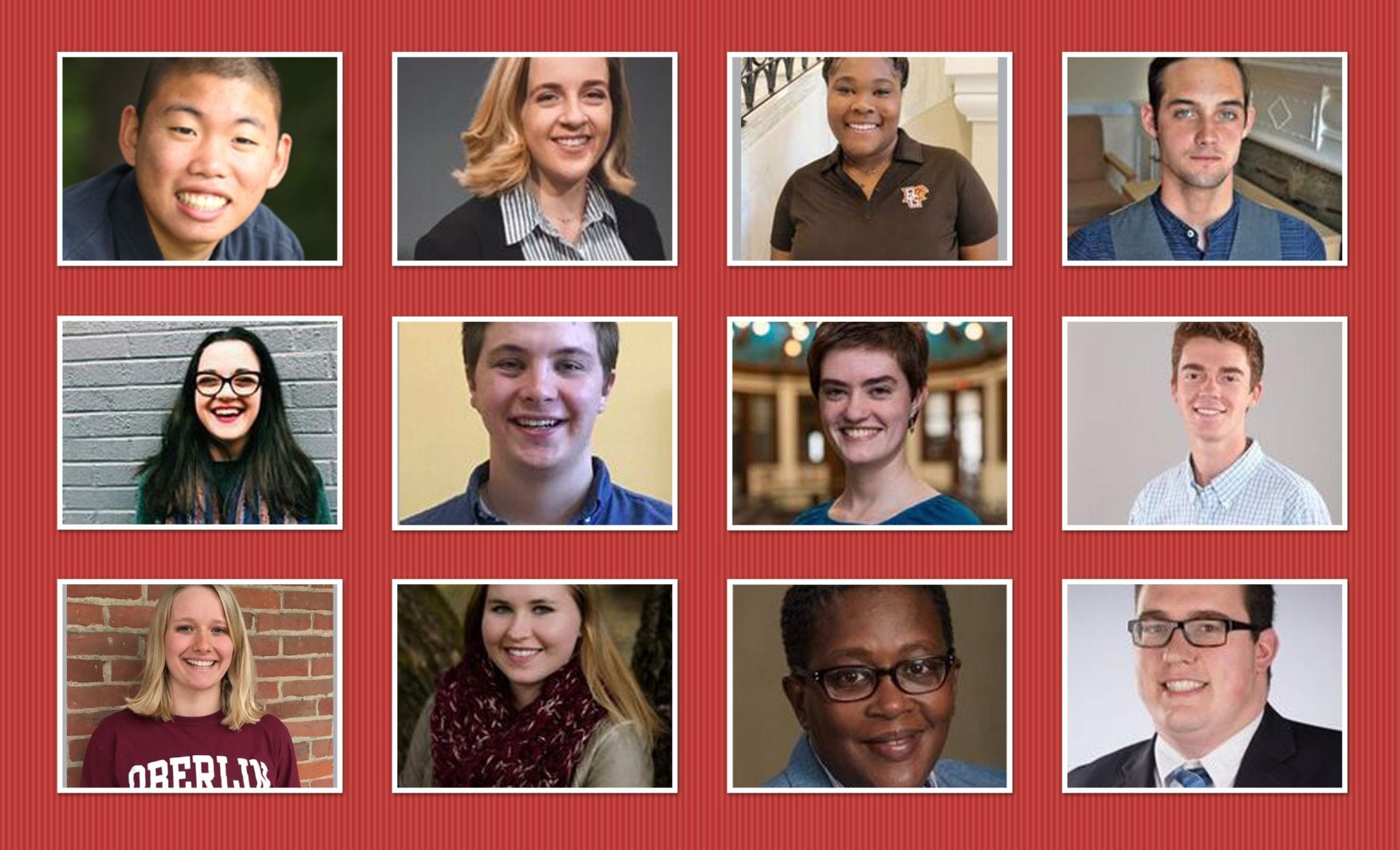
The Charles J. Ping Student Service Award, sponsored by Ohio Campus Compact (OCC), was designed to recognize and honor undergraduate students for their outstanding leadership and contributions to community service or service-learning on their campus and within their community. These students represent the next generation of civic leaders and problem solvers. The award is named in honor of Charles J. Ping, who served as President of Ohio University from 1975 – 1994. An early supporter and Board Member of Ohio Campus Compact, Ping has been a tireless advocate for campus-community partnerships and increased opportunities for students to become active and engaged citizens.
This recognition is granted annually to undergraduates at Ohio Campus Compact member institutions.
Students nominated to be a 2017 Charles J. Ping Student Service Award winner compete with other nominees from across the state for two $250 Legacy Award mini grants, to be given to a nonprofit organization of the winner’s choice.
OCC is excited to announce the 2018 Ping Awardees:
- Wyndi Moore, Baldwin Wallace University
- Angel Alls-Hall, Bowling Green State University
- Angela Gloninger, Denison University
- Tyler Jew, John Carroll University
- Matthew Johnson, Marietta College
- Sarah Dalgleish, Oberlin College
- Nicholas Pesetsky, Ohio Northern University
- Chloe Dyer, Ohio Wesleyan University
- Madison Wells, Tiffin University
- Katherine Liming, University of Dayton
- Jack Smith, Wittenberg University
- Dan Shannon, Xavier University
While all Ping awardees show exceptional leadership and initiative, OCC recognizes Angela Gloninger and Chloe Elizabeth Dyer as the 2018 Legacy Award winners!

Angela’s passion for working with refugees started two years ago, after the nonprofit she was an intern for placed her in the refugee resettlement program as an assistant to a case worker. Having no prior experience with refugees, and limited knowledge on the U.S. immigration system, she had no idea that the invaluable learning experience she obtained from this summer internship would give her the tools to lead others in helping refugees at Denison.
In the fall following this internship, she returned to campus and partnered with other students to carry out a program that brought two Iraqi refugees to Granville, OH. With help from faculty, staff, Granville residents, and students, they were able to give Mohammed and Furqan a home to stay in, jobs on campus, and a welcoming community to become a part of. This program was a huge success; Mohammed and Furqan were able to hold workshops, teach students about Arab culture, the refugee crisis, and share stories from their own experiences. They became an integral part of the Denison community. This project, the Global Fellows Project, was the highlight of Angela’s four years of college. Moving donated furniture into Mohammed and Furqan’s new home, having meals with them, introducing them to Granville and Denison, and being there for them whenever they needed something took up most of her time during that fall semester.
This year, in the fall of 2017, Mohammed and Furqan moved to Columbus, and Angela assumed leadership of the program on campus that had originally brought them to Denison. After facing countless obstacles in finding funding and support for the program, she took the resources that were available and adapted the program. While still keeping its main goal, to help refugees reach self-sufficiency, she created the Global Fellows Committee, a group of Denison students who are committed to doing what they can to help refugees in the community. Through her leadership and persistence, the committee has been able to secure a strong relationship with a resettlement agency in Columbus, OH, Community Refugee and Immigration Services. Every week, students in the Global Fellows Committee volunteer at the center as ESOL teachers, citizenship test study group leaders, in-home conversation partners, and high school student mentors.
In the face of challenges and changes, creating the Global Fellows Committee has benefitted the Denison community because it has provided students with opportunities to conduct service, connect with refugees who may not feel comfortable yet in their new homes, and become more educated on the U.S.’s role in finding solutions to the refugee crisis. These past two years showcase Angela’s leadership as she has adapted quickly to unforeseen obstacles, and showed patience and perseverance while finding a group of dedicated students committed to volunteering, and she has been diligent in establishing a partnership with the main refugee resettlement agency in Columbus. Angela’s leadership has impacted the Denison community by creating a strong foundation for the Global Fellows Committee that will allow this service to continue years after she graduates. Most importantly, she has participated in this work over the past two years because she feels a responsibility to do what she can to help all people feel welcome in their communities, especially those escaping danger or war. ~Written by Angela Gloninger, edited by Ohio Campus Compact

Chloe was born and raised in the Appalachian foothills of rural Athens County, the poorest county in the state of Ohio. While her own family was financially stable, she grew up knowing that many of her friends and neighbors struggled with economic insecurity. As a freshman, Chloe chose to participate in the Food Justice track of Ohio Wesleyan University’s orientation program. Thus, she was immediately immersed in learning about food insecurity, food deserts, and hunger in Delaware and Columbus. She learned that despite its designation as one of the healthiest, wealthiest, and most highly-educated counties in Ohio, Delaware has a serious problem with food insecurity. She also learned that, unlike her hometown where the problem is easily seen and acknowledged, Delaware’s high income per capita makes these issues virtually invisible. This experience transformed Chloe from being aware of hunger issues, as she had been throughout her childhood, into an activist determined to effect change.
During her first semester of college, Chloe learned about the Food Recovery Network (FRN), a national organization with chapters at colleges across the United States. Its mission is to divert leftover food from dining halls to community nonprofits, reducing food waste and combatting food insecurity. Knowing there were hungry people in her community, she was determined to start a chapter at Ohio Wesleyan.
Over the next months, Chloe worked to establish the required infrastructure. She met with the head of dining services to discuss logistics and spoke to campus organizations involved in service and sustainability to gauge volunteer interest. She researched local community nonprofits, looking for partner agencies and made the required weekly phone calls to FRN National. Finally, at the end of her freshman year, Ohio Wesleyan’s chapter became official. Since then, they have conducted weekly food recoveries and donated nearly 2,500 pounds of food to Grace Clinic, the free health center which serves as the community partner.
Chloe has volunteered in other capacities during her time at OWU, but her involvement with FRN has been the most important to her. FRN has taught her the importance of recognizing opportunities for connection within the volunteer experience. Often students have little or no relationship with the people serving their food, but while collecting the food for delivery, student volunteers interact with university dining staff. They also forged relationships with other clinic volunteers and the clinic staff. Personally delivering the food to the clinic allowed the volunteers to learn to know recipients as real people, not statistics. These interpersonal connections reinforced the idea service isn’t about the privileged helping the underprivileged, but about people helping other people.
Chloe started the Food Recovery Network to address a community need – but in taking the initiative to start a chapter, she also gained confidence. She now realizes that she can make a difference in another person’s life. Most importantly, as Chloe graduates from Ohio Wesleyan, she leaves with the conviction that she has the ability to initiate meaningful change in her community.
Written by Chloe Dyer, edited by Ohio Campus Compact

